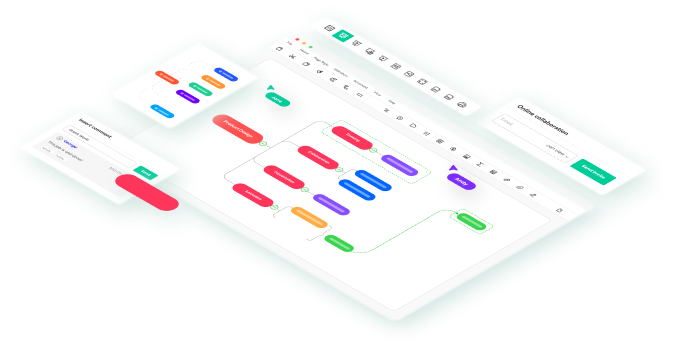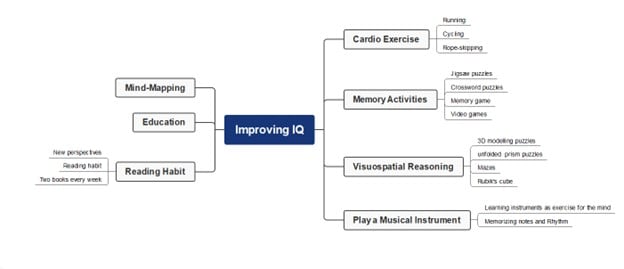Testing or measuring the intelligence quotient (IQ) is a common way for people to see where they stand intellectually. People love to share their IQ tests, especially students. Thus, improving their IQ is often a priority.
Before learning how to increase IQ (Intelligence Quotient), it is essential to understand what IQ is in the first place. Although almost everyone knows this term, its specific meaning might still be unclear to most.
This article explores IQ's definition and various aspects, ultimately examining how to improve them through other methods.

In this article
What Is an Intelligence Quotient (IQ)?
Every human has specific intellectual intelligence that is expressed as IQ. Although several tests exist worldwide, the Wechsler Intelligence Scales are the most used.
It is categorized into two segments, namely Wechsler Adult Intelligence Scale – Fourth Edition (WAIS-IV) for adults (published in the year 2008), and Wechsler Intelligence Scale for Children – Fifth Edition (WISC–V) for children (published in the year 2014).
The following tables explain how a person’s IQ is classified according to the Wechsler Intelligence Scales:
| IQ Score Range | IQ Classification |
| 130 or more | Very Superior |
| 120 to 129 | Superior |
| 110 to 119 | High Average |
| 90 to 109 | Average |
| 80 to 89 | Low Average |
| 70 to 79 | Borderline low |
| 69 or below | Extremely low |
As the title suggests and explained earlier, these scores are not final, and your IQ can be increased if you are willing to do so. The following section describes how to increase intelligence to improve your IQ.
6 Simple Practices To Raise Your IQ
Intelligence Quotient (IQ) is directly related to your brain; the more you sharpen it, the higher your IQ will be. How do you sharpen your mind, you may ask?
The answer is to maintain a healthy mindset as much as possible. Below are a couple of simple practices that would help you increase your IQ level if exercised regularly:
Cardio Exercise
It has been scientifically proven that regular exercise keeps you fresh and mentally relaxed. Since all the toxins are excreted from your body when you sweat, your body can breathe in through all its pores.
With cardio exercises like running, bicycling, skipping the rope, etc., you breathe in more, and your brain gets more oxygen, thus becoming healthier gradually.
With a healthy and fresh mind, your thought processes improve, which in turn increases your IQ.
Do Memory Activities
The more you use your brain, the higher your IQ will be. There are many ways to engage your brain in memory exercises. Most of them involve solving puzzles. Some proven ones are:
- Jigsaw Puzzles. Begin with the one that has smaller pieces, and then progressively increase the challenges as you move forward.
- Crossword Puzzles. Start with the small and easy ones, then increase the difficulty level as you proceed.
- Memory Game. A game where you match cards after memorizing them.
- Video Games. Puzzle games with good graphics, or even those mystery ones, can also help sharpen your IQ while having fun.
Visuospatial Reasoning
Visuospatial reasonings force your brain to work based on what you see. When you look at something, your eyes send signals to the brain to process it.
The more challenging and confusing an object is, the more mental processing is involved in decoding the puzzle. Some useful tools to improve your IQ with visuospatial reasoning include:
- 3D Modelling Puzzles
- Unfolded Prism Puzzles
- Mazes
- Rubik's Cube
Play a Musical Instrument
As with the human body, even the mind needs a bit of relaxation, and music dramatically helps. Musical instruments can be a great mental exercise. Following this practice daily would help a lot.
In addition, when you learn to play a musical instrument, you memorize the notes and how your fingers need to be used rhythmically. This improves hand-mind coordination.
Reading Habit
With every book you read, you digest several new thoughts. In fact, with each page you go through, you walk alongside the author. This habit is living a new life from the writer’s perspective.
With the habit of reading something every day, you make your brain accustomed to accepting at least one new thing daily, thus gradually increasing your IQ. It doesn’t matter what you read or your favorite author.
The idea is to make reading a part of your daily routine and ensure you enjoy it. Good practice involves reading and completing at least two books per week to see remarkable improvements.
Education
Understanding the difference between earning a college degree and having wisdom is imperative. If you are a bookworm, you might have valuable insights about a particular topic that could help you land a job.
If you are fond of learning, you wouldn’t mind picking varied topics to educate yourself. That said, being interested in education and regularly upgrading your skillset is another effective way to increase your IQ.
Another Way To Improve Your IQ: Mind Mapping With EdrawMind
Mind mapping is more than a note-taking method. It helps organize ideas visually, making complex information easier to understand and remember. Turning scattered thoughts into structured diagrams can strengthen focus, creativity, and problem-solving skills.
Using a tool like Wondershare EdrawMind, you can design mind maps that make learning faster and more engaging, which contributes to improving IQ.
Benefits of Mind Mapping for Improving IQ
Mind mapping isn’t just the act of making a diagram. It’s a mechanical act that triggers your reasoning and brain’s functions to draw the following benefits:
- Better memory retention. Visual structures make information easier to recall.
- Improved problem-solving. Breaking ideas into branches helps you see patterns and connections.
- Stronger creativity. Mind maps encourage brainstorming and free association.
- Efficient learning. Significant concepts are simplified into smaller, manageable ideas.
- Clearer communication. Organized diagrams make sharing ideas easier and more effective.
Sample Workflow
You can explore how you can use mind maps to improve your IQ. It’s more of using mind maps to explain the topics you’re trying to learn.
You'll get many intellectual benefits by forcing your brain to summarize ideas into keywords and correlate them together.
Step 1:
Start by editing the central topic node. This should be the actual topic you’re trying to study. For example, here it’s “Improving IQ.” Then, add in the main branches. You’ll see that the content above is used here.
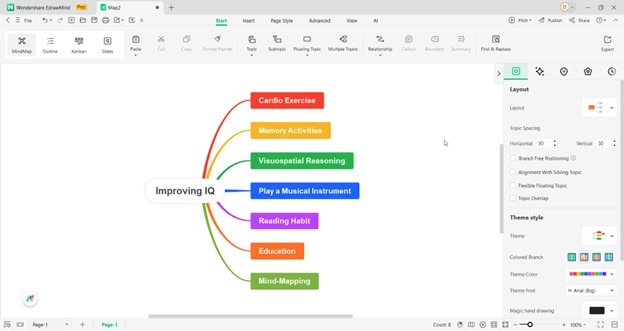
Step 2:
Then, add the Subtopics under each main branch. These should be bite-sized keywords.
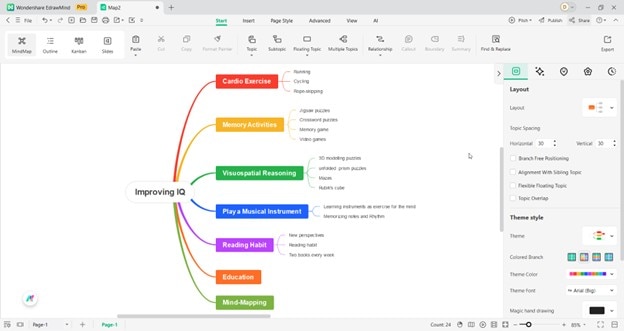
Step 3:
Once done with the content, design your mind map accordingly. Change the shapes, add relevant pictures, and use different colors and themes.
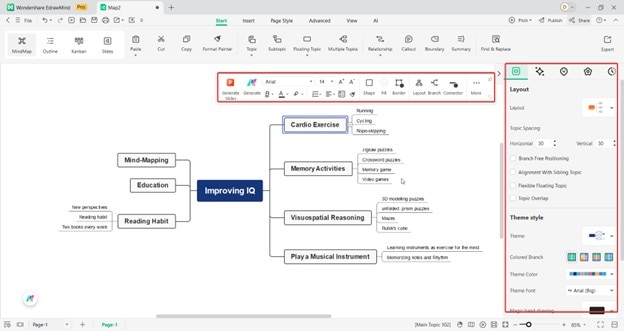
Step 4:
Export your mind map to your desired file type. It’s best to discuss your creation with other people.

Other Ways You Can Use EdrawMind’s AI Tools for IQ Improvement
If you need some assistance, it can also be great to use EdrawMind’s AI tools. While too much reliance on AI can be counterproductive, learning how to use it well is key.
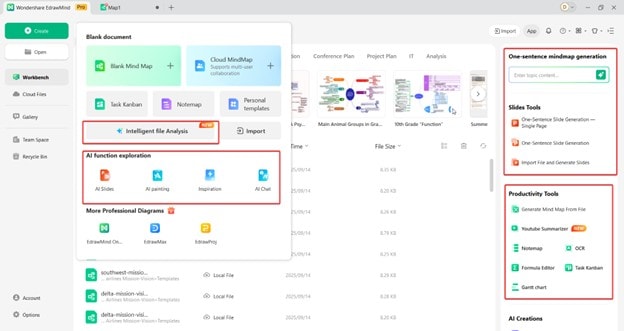
Here are some of EdrawMind’s AI tools and how you can improve your IQ. The key here is to make sure to review its outputs to keep your brain working:
- AI Presentation. Turn complex topics into bite-sized slides. Reviewing ideas in structured formats sharpens memory and strengthens logical thinking.
- File to Slide. Upload reports, research notes, or study guides and convert them into slides. This helps break down large chunks of information, improving comprehension speed.
- Pic to Slide. Use images to build visual associations. For example, upload a science diagram, and the tool will generate labeled slides. Linking images to concepts enhances spatial and visual intelligence.
- AI Mapping. Enter a theme like problem-solving strategies, and the tool creates clusters of related methods. This develops critical thinking by showing how ideas connect.
- Concept Map Maker. Build diagrams that highlight cause-and-effect relationships. Mapping links between events, solutions, and outcomes improves analytical skills.
- Text to Mindmap Maker. Paste articles or case studies; the tool will extract key ideas into a mind map. This trains you to quickly identify patterns and key points, a skill vital for higher reasoning.
Conclusion
After understanding how to increase IQ using the simple practices discussed above, it is time to dive in and start working on them. However, to stay organized, make sure to create a timetable.
The best approach is to use mind mapping techniques and draw a labeled diagram with the help of a tool like EdrawMind, which can help you stick to the schedule.
Here are some frequently asked questions related to the topic of improving your IQ:
FAQ
-
1. Can IQ increase after 25?
Yes, IQ can improve slightly at any age through learning and practice. Brain plasticity continues, though it slows over time. Training can sharpen memory and processing speed.
Fluid intelligence peaks in the mid-twenties and then declines. Crystallized intelligence, or knowledge, can grow throughout adulthood. Gains are usually modest and linked to specific skills.
-
2. Is IQ genetic or nurtured?
Both genes and environment shape IQ. Genetics explains much of the variation, but factors like nutrition, education, and upbringing matter strongly in childhood.
As people age, genetic influences become clearer. Still, poor environments can lower IQ, while enriched ones can raise it.
-
3. Does IQ define intelligence?
No. IQ tests measure reasoning, patterns, and processing speed, but not creativity or emotional intelligence. They also miss practical skills and may contain cultural bias.
IQ relates to school and job success, but is not destiny. Traits like motivation, personality, and opportunity often matter more.



